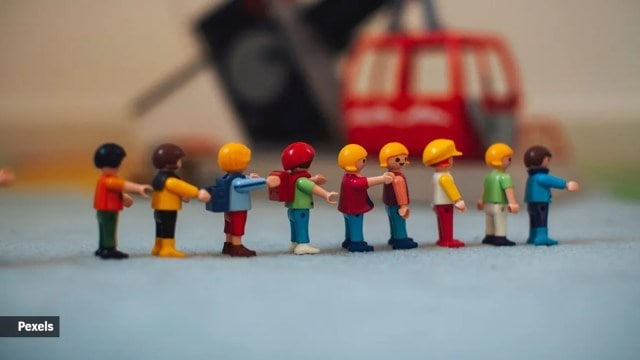
When the Jaadui Pitara (magic box) was launched on February 20, 2023, by the Minister of Education, a few children were invited on stage to unveil it. Having opened the box, the children looked through the books and flashcards. As they spotted the toys lying underneath, their eyes lit up and they thronged the box like children around a birthday cake. They picked up their favourite toy from the box — a doll, puppet, tambourine — beaming from ear to ear and became engrossed in their world, with the stage and ceremony fading into the background. The toys elicited wonder, curiosity, and joy. The audience of over five hundred administrators, academicians, and teachers, remembered their childhood and broke into spontaneous applause and beaming smiles.
With bright eyes, laughter — and an occasional wail — children will make their way to classrooms across India at the start of the new school year. Let us celebrate the new learning year by making it welcoming, joyful, and playful for every child. Play is natural for children and a powerful tool for holistic development — physical, socio-emotional, language, cognitive, and cultural. It allows children to be curious, and explore and experiment in a safe, fun, and non-judgemental space.
Recently, India and the world observed the International Day of Play on June 11 (as declared by the United Nations), recognising the importance of play for children to thrive and achieve their full potential. India has also stressed on play and has been a pioneer in institutionalising it.
The National Education Policy (NEP), 2020, and the National Curriculum Framework for the Foundational Stage (NCF-FS), 2022 for the first time envisaged and crafted a curriculum framework for the foundational stage (covering ages 3-8). The core transformative aspect of NCF-FS is “learn through play”, giving legitimacy to what is known instinctively: When children play, they learn. Learning does not just happen through writing or reading and it’s imperative not to force a particular style of learning. There are as many pathways to learning as there are learners. Play includes conversation, storytelling, toys, songs and rhymes, music and movement, arts and crafts, and indoor and outdoor games. This interaction creates an indelible bond among students, teachers, parents and the community.
A symbol of the transformative nature of NCF-FS is NCERT’s Jaadui Pitara, which exemplifies the content needed in any school for the foundational stage. It is diverse and demonstrates the sensibilities (age-appropriate, local, with sensory experience) to be kept in mind while developing such content. The Pitara has toys, games, puzzles, puppets, posters, flashcards, storybooks, playbooks and teacher handbooks. Each toy and play is mapped to a definite learning outcome. Stakeholders across the country have appreciated the transformative teaching-learning materials found in the Jaadui Pitara. Efforts are ongoing by states to customise the box’s contents for their local context and milieu.
Recognising that we now live in the digital era and that technology-enabled channels can accelerate and amplify the reach and impact of the Jaadui Pitara, the Ministry of Education launched the e-Jaadui Pitara in February to complement the physical box and democratise access through multiple channels: Computers, smart- and feature-phones, television and radio. Caregivers can now interact with virtual assistants, leveraging generative AI through chat and voice features, to tell stories and ask questions on engaging children in play-learn activities.
Several studies on child development and the brain too indicate that play is essential for: One, brain development, especially stimulation of the prefrontal cortex, which is responsible for attention, problem-solving and regulating social behaviour; two, neuroplasticity or ability to form new neural connections, fundamental for learning and adapting throughout life; three, intuitive knowledge, essential for problem-solving and decision-making in complex and uncertain conditions.
The importance of play as a fundamental aspect of parenting in building the foundation for children’s growth and development, right from infancy, is underscored by international agencies like UNICEF.
During play, children are continuously making choices. They are full of wonder and joy. Play fosters holistic development, creativity, and resilience among children. For adults, play enhances mental health, cognition and creativity. When parents and caregivers engage children in play, they celebrate play. Let’s celebrate play and help children learn and develop. Bachpan manao, badhte jao.
Kumar is Secretary, Department of School Education and Literacy, Government of India and Maruwada is CEO and Co-Founder, EkStep Foundation, Bengaluru
© The Indian Express Pvt Ltd
First uploaded on: 02-07-2024 at 06:56 IST



